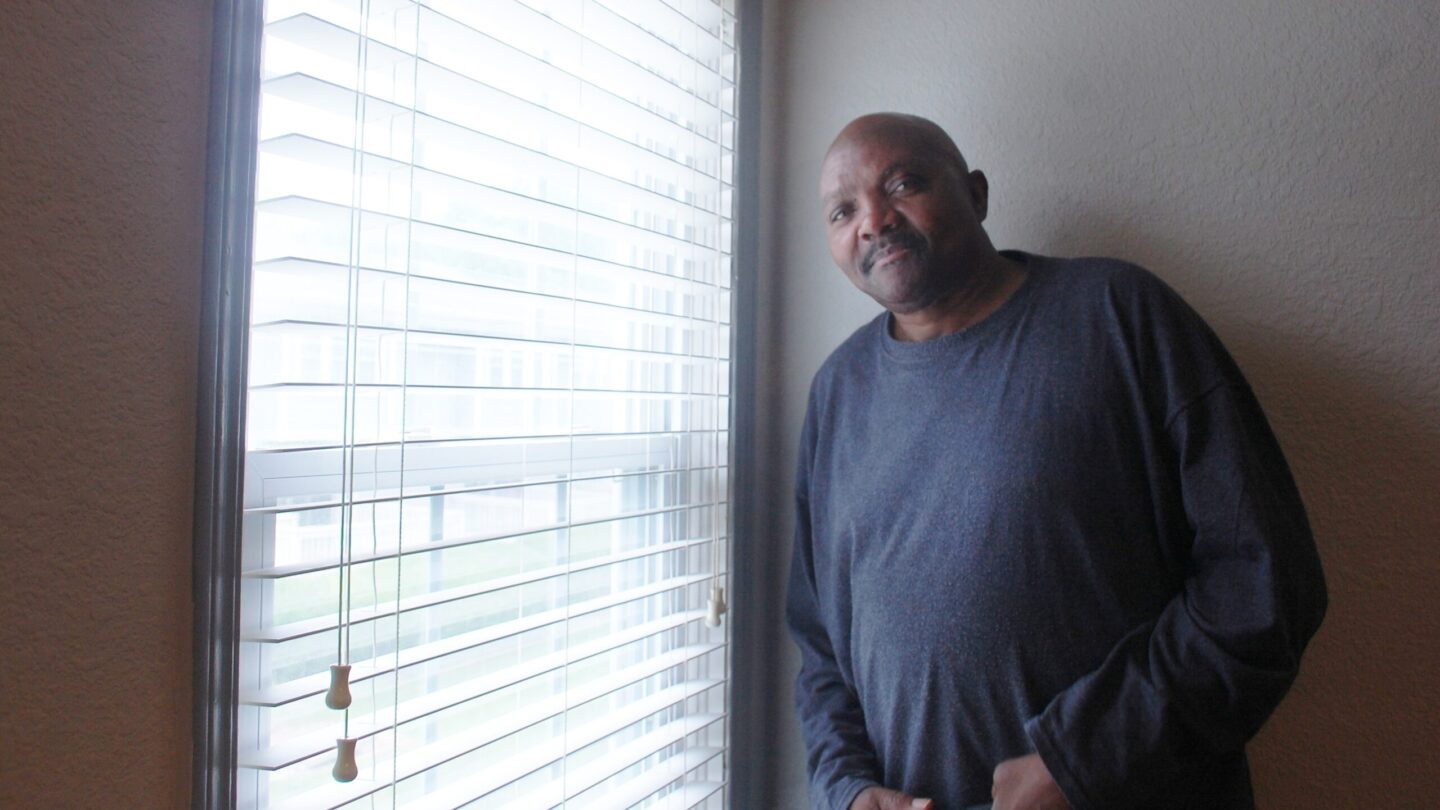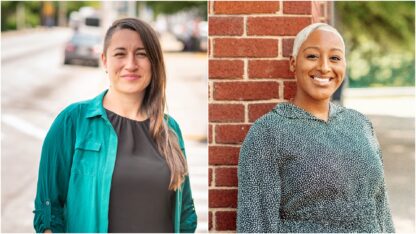Since the start of the pandemic, Atlanta has helped house nearly 800 people living outside or in shelters. The city credits the program for a roughly 40% drop in the number of homeless counted in its latest survey.
But the experience of residents at one apartment complex illustrates how difficult it can be for some to find stability in the current housing climate.
Sammie Carter has kept his two-bedroom unit at the Elliot on Abernathy in Sandy Springs simple. To the white walls and white carpet, he’s only added a colorful rug, a bistro-style table with stools and a living room couch.
In his year and a half here, he’s focused instead on personal growth. Before this, he was without permanent housing for years. When he goes through the reasons why, he sticks to short phrases.
“Divorce. Job. Some drugs and drinking. And associating myself with wrong-doing peoples,” Carter said.
When his family left for another state, he said he lost the will to live. He stayed in a car, an abandoned house and on the street.
It was when Carter got into a men’s shelter that things started to shift. There were no drugs or alcohol and he could get a job. Then, in the middle of the pandemic, a nonprofit called him about the rehousing program and this place in Sandy Springs.
The suburban garden-style apartments are quiet, he said. Everyone keeps to themselves, including him. He doesn’t want a bunch of people hanging around anymore.
“Hooping and hollering and yelling — no, not with that. That’s past me,” he said.
He prefers to sit inside, where he can write about his life and read novels by James Baldwin — his favorite author. He’s started speaking with his children again. Sometimes he’ll spend hours on the phone with his brothers.
This place has allowed Carter the space to imagine a new direction for his life.
“My next birthday I’ll be 70 years old. Not no old man but I’m not no young man either,” Carter said. “I just want things to get better for me.”
But already, Carter has to move. Earlier this spring, he was one of several residents in Atlanta’s rehousing program who got an eviction notice. The complex, which provided only a brief statement and did not respond to further questions, said the program didn’t pay the rent. Officials with the program, however, said the complex stopped accepting payments.
Cathryn Vassell, director of the nonprofit Partners for Home, which leads Atlanta’s homelessness policies, said the program still hasn’t been perfect. There have been issues transitioning hundreds to new housing and coordinating with case workers across agencies.
“So, that’s what we’re up against,” Vassell said. “Now, on top of which a market that is just incredibly challenging to navigate.”
Since the effort began in 2020, rents have increased dramatically — 30% according to Zillow. With mainly federal funding, she said it’s hard for the program to keep up.
Units are also more competitive, said Matt Hurd executive director of a nonprofit called Open Doors that’s helping find landlords.
“I mean, we’re at about an average 97 to 98% occupancy rate in this region, and that’s the highest it’s been, I think, ever?” he said.
It isn’t easy to pitch properties on an effort to house formerly homeless tenants. Apartments are selling at least once every two years too, Hurd said. So the rehousing program may negotiate an agreement with one owner, only to learn the next owner isn’t interested. This is what happened with the Sandy Springs complex where Sammie Carter lives.
The program has few other properties like it now.
“Increasingly, we’re having to go out further and further into other parts of the market,” Vassell said. “And we’re not going north, I can tell you that much.”
The barriers in the market come as Atlanta’s network of homeless service providers launch a second round of the rehousing push. Mayor Dickens announced that the city and state have allocated $25 million in new support, largely from the federal American Rescue Plan.
That may not help Carter’s situation. He’s reluctant to leave his area on the north side. He has a church nearby and he doesn’t have a car. It’s the environment he feels he needs.
Before this apartment, he was placed in a different complex in South Atlanta. He said there were so many people doing drugs and shooting, that he left after six months. He went back to the shelter.
Carter said he hopes to get a job again and maybe even finish his education. But he wants to establish where he’s going to be first.
“I don’t want to say I’m just living off the state,” he said “It’s a lot more left for me to do and I want to do it.”
After WABE reached out, his complex dropped the eviction case against him. But according to the program, this is still with the understanding that he and other formerly homeless residents will move.








